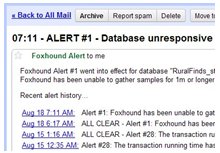1 - Why? Why? Why?
It feels like 1993 all over again. That was when Windows 3 was taking over the world.
Now, handheld devices are hot. So hot, they're making web servers look like mainframes.
"The PC will undoubtedly remain at the heart of computing at home, work,
school, but it will be joined by numerous new intelligent devices and appliances,
from handheld computers and auto PCs to Internet-enabled cellular phones."
- Bill Gates, 1999 Microsoft Annual Report
Why Palm?
If Windows CE was going to make it, it would have made it by now. But it's Palm that's
got the market share. Something might come along to displace Palm but it sure isn't
going to be CE, at least not until it's been rewritten a few more times.
"But what about color?" Well, color hasn't hurt Palm sales, or
helped CE, but it's coming...
see
http://news.cnet.com/news/0-1006-200-920048.html.
In 1993 the smart folks were saying that OS/2 was better than Windows.
That was like saying that Beta was better than VHS... perhaps true, but definitely
irrelevant.
In 1993 Windows had a lock on the PC, and in 1999 it's Palm that dominates the
handheld marketplace. Lotus and WordPerfect bet their companies on OS/2, and
now those companies no longer exist.
"Within four to five years, over 80% of corporate users will
have one or more companion computing devices, like
PDAs, handhelds, smart phones, etc., in addition to a primary computer.
Each of these devices will be required to integrate into the corporate
application infrastructure."
"While some will be thin client
devices that connect via a web-based interface and then
go away, many more will include a local application and data store.
These will require application distribution and
database synchronization to achieve true mission critical integration."
- Jack Gold, Senior Program Director at META Group, August 23, 1999
Why HotSync?
The HotSync button on the Palm cradle is the simplest User Interface I've ever seen.
You push the button once, and all your updates on the Palm are transferred to your desktop,
and vice versa. If you've LOST everything on the Palm, pushing the HotSync button
restores it all from the desktop... no options to set, no questions to answer. It's
even simpler than dialing the telephone.
So, there might be better ways to transfer large amounts of data, and I might use them
sometime in the future, but HotSync is the synchronization method of choice for this
document, right now, this minute.
Why UltraLite?
Sybase SQL Anywhere is the best Relational Database Management System on the planet.
UltraLite comes from the same folks. Enough said... I'm not even going to argue about it.
"Sybase's new data management and synchronization technologies
will provide embedded developers with a fully-functional data solution for enabling
embedded devices to be integrated as key components in an enterprise solution."
- Chris Kleisath, Director of Product Management,
Sybase's Mobile and Embedded Computing Division,
September 28, 1999
OK, look... there might be other RDBMS' that are faster in some area, or bigger in some other
area, but from a developer's point of view nothing beats SQL Anywhere.
Why This Document?
This document has a very limited purpose [take a deep breath]:
To help you get past
the roadblocks and hurdles standing between you and your first Palm OS
application program which updates and synchronizes a local Sybase SQL Anywhere
via the UltraLite deployment option.
[exhale now]
There's a lot to learn, even with a trivial "hello, world" application.
That's why this document exists, and why it is constrained:
-
The minimal application, no bells and whistles, no "real world" business case.
-
One solution given, no alternative approaches considered.
-
One platform supported, no attempt at portability.
-
All the details exposed, no stone left unturned, no assumptions made.
The last point (all the details exposed) is the real reason for writing this
document, and it is the reason for the 1st three points: There are so many
details that some limits are absolutely necessary.
|
|

